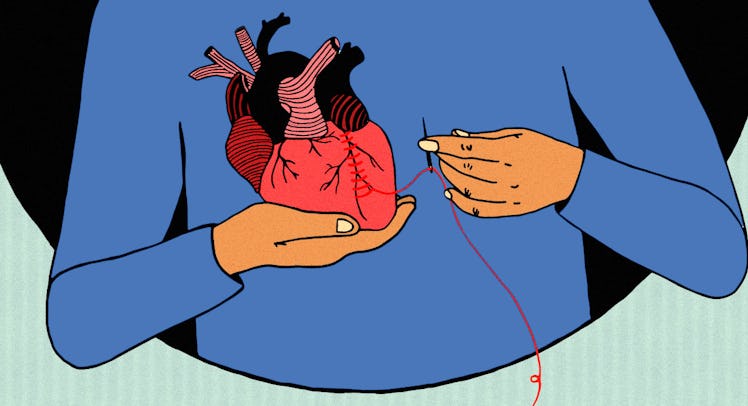To Get Over Heartbreak, First Understand That You’re Experiencing Withdrawal
It causes the exact response in the brain you might expect when you stop an addictive substance cold turkey.

Most men believe that, while a romantic breakup might be devastating for teenagers, dads should just suck it up. Sure, the ruination of a relationship might make you feel upset and disappointed, but you deal with the pressures of life and the demands of parenting every day. A broken heart shouldn’t make you fall to pieces.
Except it probably will.
In more than twenty years of clinical practice, I’ve seen adults of all ages and backgrounds face romantic heartbreak and it’s just as shattering for 30, 40, and 50-year-olds as it is for teenagers. And keeping up your duties as a father, being there for your kid(s) when your world feels like it has just fallen apart is incredibly challenging. As I describe in my new book, How to Fix a Broken Heart, what makes heartbreak such a devastating psychological wound is how it impacts our brain.
We all know that heartbreak can be intensely painful, but new science has now shown us why. Brain scans have revealed that being brokenhearted triggers the same mechanisms in our brain that get activated when we experience intense physical pain. Except that while intense physical pain usually lasts only seconds or minutes before reducing to throbbing (think: breaking an arm or leg), the intense waves of emotional pain caused by heartbreak can continue for hours, days, weeks, or even months.
Brain scans have revealed that being brokenhearted triggers the same mechanisms in our brain that get activated when we experience intense physical pain.
Heartbreak consumes us. We think of little else other than the breakup and the person who broke our heart. We feel desperate to regain the love we lost, obsessed with trying to understand why the breakup happened, overwhelmed by memories and snapshots of what was and what could have been. Our eating is disturbed, our sleeping is disturbed, and nothing else matters as it did before. We are unable to focus, to concentrate, to think creatively, or to function as we normally do. Forty percent of heartbroken people experience symptoms of clinical depression. In short, heartbreak causes an intense grief reaction similar to those associated with other forms of significant loss such as the death of a close relative.
And yet, as a society, we do not take broken hearts as seriously as we should. Few people would dare to ask for time off work to mourn a breakup from a girlfriend or boyfriend and those who do are likely to be told to “grow up,” or “snap out of it.”
But recovering from heartbreak is no easy task, as our own brains work against us. Recent brain scans have revealed what most new couples know all too well: love is addictive. And that means that the withdrawal of romantic love causes the exact response in the brain you might expect when you stop an addictive substance cold turkey: intense withdrawal. In fact, studies have found that the brain reacts to heartbreak much like it does when an addict is withdrawing from substances like cocaine or opioids. That’ s why we become so obsessed, so desperate, why nothing else seems to matter — we are going through acute withdrawal and all we want and need is our ex.
Studies have found that the brain reacts to heartbreak much like it does when an addict is withdrawing from substances like cocaine or opioids.
Addicts know heroin is ruining their lives but they simply can’t help themselves for seeking another fix; the compulsion is just too strong to resist. We feel the same way when our heart is broken. The urge to reconnect and reconcile with our ex — even when we know they are wrong for us or that doing so would make us feel worse — is often too powerful to ignore. So we text and we call and we stalk them on social media, and by doing so, we set back our recovery and intensify our emotional pain.
So what can be done? In order to recover more quickly so we can be fully engaged in our lives and fully present with our kids again, we have to take several steps, none of which are easy. Even if you know what to do, recovering from heartbreak still requires great determination. And it requires something else as well: a willingness to let go, to accept that it’s over.
Once you’ve crossed that divide, here are the steps you need to follow:
- Go cold turkey and have no contact with your ex whatsoever (if not, try for as minimal contact as possible)
- Get social support from friends who are good at expressing empathy and compassion.
- Avoid idealizing your ex by focusing on ways they and the relationship were wrong for you.
- Fill the voids the relationship left in your life by reengaging in old/new activities and friendships.
Heartbreak is devastating. Yes, you will feel better in time — but how much time is up to you. If you acknowledge the challenges heartbreak presents, avoid the mistakes that can set you back, and take steps to heal, you will recover more quickly and more fully. And your family will benefit from having their father back just as much as you will.
Guy Winch, Ph.D., is a licensed psychologist, author, keynote speaker whose books have been translated into twenty-four languages. His upcoming book, How to Fix a Broken Heart will be published by TED Books/Simon & Schuster in February 2018.
This article was originally published on